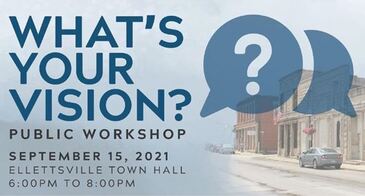 A public workshop to explore the future of Ellettsville is planned for Wednesday, Sept. 15 from 6-8 p.m. at the Ellettsville Town Hall, 1150 W. Guy McCown Drive. Called Envision Ellettsville, the project aims to create a clear identity and long-term vision for the Ellettsville community. The hope is to provide a framework for future planning. Learn more on the Envision Ellettsville website.
0 Comments
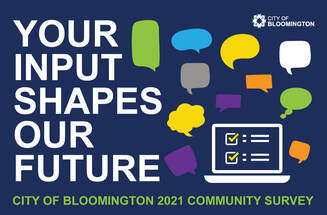 At the July 21 Bloomington Council meeting, results from the 2021 Community Survey were presented. Among the key findings:
Read the full report here. Watch the consultant's presentation to council on CATS here. 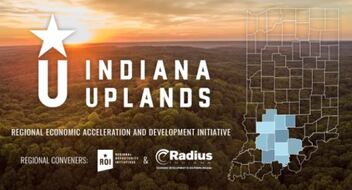 The 11-county region known as the Uplands – which includes Monroe County – will be submitting a proposal for funding through the Indiana Regional Economic Acceleration and Development Initiative (READI). The Uplands proposal is being led by Regional Opportunity Initiatives (ROI) and Radius. They are asking organizations and individuals to provide information on potential projects and programs that have the capacity to grow the region’s economic outcomes through investments in place-based talent, business, and quality of place opportunities. Read more about this initiative here. Submit your project ideas here. The deadline to submit ideas is July 30. 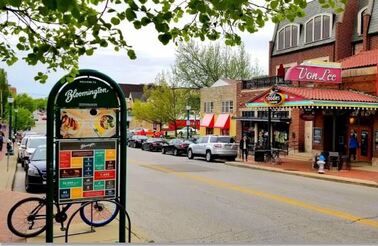 An analysis of first-floor commercial space in downtown Bloomington was the focus of a 2021 Capstone project by Indiana University O'Neill School students. The report makes several recommendations, including:
Read the full report here, or watch a presentation on the report here. 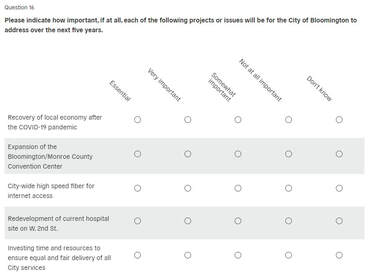 The City of Bloomington has opened its 2021 Community Survey to the general public, with a May 5 deadline to respond. It asks a variety of questions related to issues that affect quality of life, the economy, public services and more. This is the third survey administered for the city by the National Research Center Inc. (NRC). Similar surveys were done in 2017 and 2019. Click here to take the 2021 Community Survey.  Note: This "It's Your Business" column by Erin Predmore, the Chamber's President & CEO, first appeared in the Aug. 14 issue of the Bloomington Herald-Times. Earlier this summer, we unveiled an important historical marker for our community as a whole, for the business community and, most importantly, for the Black business community. In the 1960s, a business called The Black Market operated in the spot where Peoples Park is located now. Owned and run by Indiana University grad student Rollo Turner, it was a Bloomington store celebrating Black culture, with African art, clothing and music. It was a welcoming place for Black IU students and community members to gather. On Dec. 26, 1968, in a violent reaction to the civil rights movement, the Black Market was firebombed. What was one moment a thriving, locally owned business and center for Black culture became in the next moment a burning symbol of hatred and racism. The store was destroyed in the fire. As time passed, this location became a gathering place for local students, civil rights activists and other residents. The family that owned it later gave this land to the city of Bloomington to be maintained forever as a public park — Peoples Park. But as time passed, the story of this place — The Black Market, the firebombing, and its place in the history of the local civil rights movement — was left behind. People stopped telling others about it, and many residents never knew what happened here. I first learned about this history almost two years ago, when the Greater Bloomington Chamber of Commerce began working with leaders in the Black business community in an effort that led to the formation of the chamber’s Black-Owned Business Affinity Group. With their leadership, we partnered with the city of Bloomington to submit an application to the Indiana Historical Bureau. That work led to the installation of an historical marker at Peoples Park that we celebrated on July 31. But really, we were celebrating our community’s Black business owners and acknowledging that what happened here in 1968 still matters to Bloomington today. We forget that history at our peril. The treatment of people of color in Bloomington and Monroe County has been horrible, ranging from microaggressions at work to racial profiling to physical violence. Taking a stand against these behaviors is required by of all of us who want to be decent and humane. For those who don’t believe this is a moral issue or don’t acknowledge that racism still exists here, at least consider the economic impact of our community’s reputation. This summer, our office has fielded calls and emails from individuals and groups who were no longer willing to come to Bloomington because of the racist actions of some of our community members. In 2018, visitors spent over $418 million in Monroe County. What would we do if they all decided not to come back after the pandemic abates? Here’s another harsh reality, from the Monroe County Quality of Place & Workforce Retention Plan: “Minority residents do not feel the sense of welcoming community that Monroe County prides itself on. The legacy of the KKK in the region is remembered and felt today. Recruiters have trouble attracting diverse candidates to the region, to Monroe County, and to Bloomington.” Our community’s success is intricately tied to the success of our neighbors, friends and colleagues. We will all rise or fall together, and we can only rise by supporting those who need to be recognized as valuable members of our community. We must embrace the minority members of our community and stand for equality, equity and inclusion. To all people of color, the chamber is glad you are here.  Kate Galvin, Sean Starowitz & Linda Pisano Kate Galvin, Sean Starowitz & Linda Pisano Three panelists representing different aspects of Bloomington's performing arts sector shared their views at an Aug. 13 Chamber Speaker Series event. Speakers were:
Topics in the wide-ranging discussion included the impact of COVID-19 on performing arts organizations, how groups are adapting in creative ways, infrastructure needs, ways that new collaborations are forming, and the need for ongoing support during these challenging times. According to a 2019 study commissioned by Cardinal Stage, the Bloomington/Monroe County performing arts sector adds over $4 million annually to the local economy and supports more than 160 jobs here. Click here to view a recording of the Speaker Series discussion. 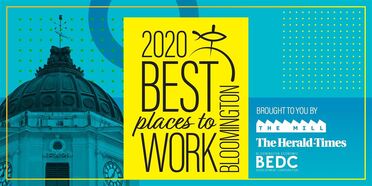 March 6 is the deadline to apply for the 2020 Best Places to Work Bloomington. The awards are open to any business with an office in Monroe County and the equivalent of 10 or more employees. Click here to apply. Best Places to Work Bloomington is part of a national awards program. Locally, it is sponsored by Dimension Mill, the Bloomington Herald-Times, and the Bloomington Economic Development Corp. An awards ceremony will take place at The Mill on June 9, 2020. Click here for more information. 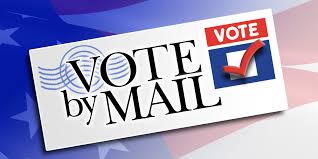 Chamber CEO Erin Predmore Chamber CEO Erin Predmore February is Black History Month, the perfect time to reflect on our community’s diversity. It’s also a time to challenge ourselves, take a hard look at where we fall short – we’re not as diverse or welcoming as we’d like to believe – and take steps to strengthen those areas. In the past year, the Chamber has made a commitment to supporting the work of black business owners in Bloomington and Monroe County. We’ve started an affinity group that meets regularly to strategize about how to raise up their voices and tackle issues specific to growing their businesses. We also surveyed black business owners to get a better handle on their economic impact. The 27 respondents reported a total of $2.557 million in gross annual revenues, employing nearly 60 workers. In total, they reported 237 years in business, reflecting a depth of experience and the important role those businesses have played in our community’s history. The Chamber is honoring part of that history – and acknowledging the often-uncomfortable legacy we share – by placing an historical marker at People’s Park to highlight the significance of that location. In 1968, an African American student named Clarence “Rollo” Turner led protests against racial discrimination that were met with open hostility in Bloomington. That fall, he opened the Black Market in the location where People’s Park is located today. It sold books, clothing, records, artwork and other crafts made in Africa or by African Americans and acted as a cultural center for black students at Indiana University. On December 26, 1968, the Black Market was firebombed, and the entire store destroyed leaving Bloomington residents to grapple with the brutal and harsh realities of racism. Two Ku Klux Klan members were eventually convicted of the arson. In 1970, IU students began developing the vacant lot into People’s Park, a place for activism, recreation and free expression. The marker, awarded by the Indiana Historical Society, will be placed in People’s Park with a celebration on May 1. We’ll be providing more details about the event soon and hope you can join us. Before then, February is full of Black History Month events: discussion panels, lectures, performances, film screenings and other activities throughout the community. I urge you to check out the calendars for Indiana University and the City of Bloomington to find at least one way to get involved. Our past is still very much present – the things that make us proud, as well as the things we struggle to overcome. I hope you’ll join me in working to build a community that embraces everyone. Note: This column by Chamber CEO Erin Predmore was published in the February issue of BizNet, a Chamber publication in partnership with the Bloomington Herald-Times. 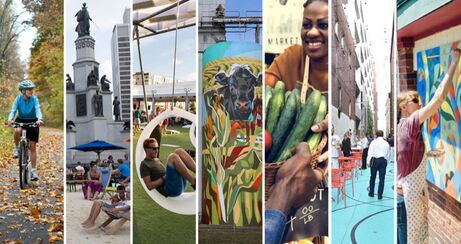 As part of its Better Together – Creative Places Initiative, the Community Foundation of Bloomington and Monroe County is seeking applications for $20,000 in grants to activate or create public spaces that advance a more vibrant, welcoming, and inclusive community. Proposals will be accepted from organizations that are designated as 501(c)(3) entities or that fall within the category of an exempt organization, such as schools, governmental units, and religious organizations. Projects proposed should:
Click here for more information on how to apply. The application deadline is Feb. 29, with grants awarded in April 2020. |
Categories
Categories
All
Archives
Archives
May 2024
|
|
Copyright The Greater Bloomington Chamber of Commerce. All Rights Reserved.

 RSS Feed
RSS Feed
